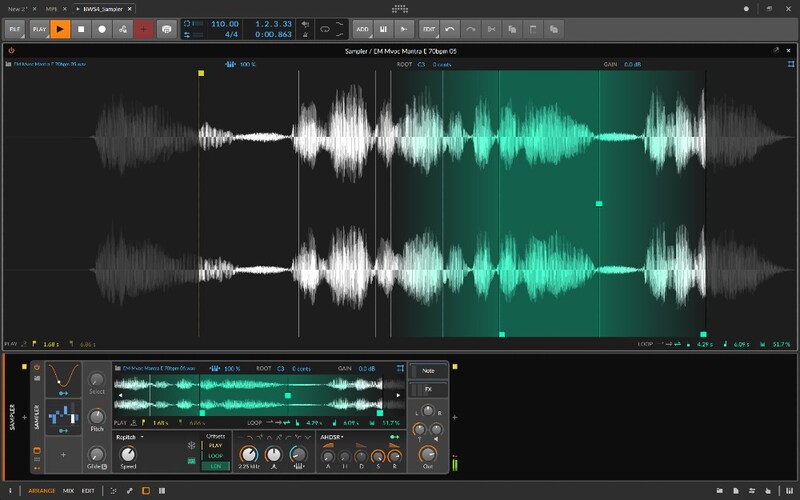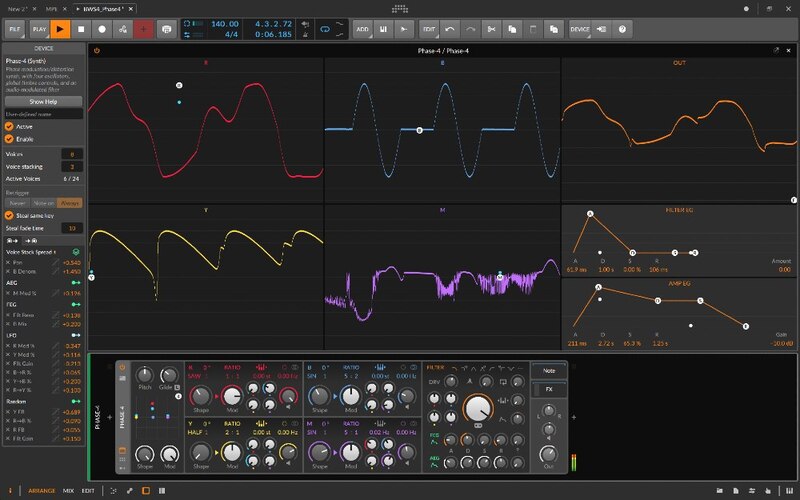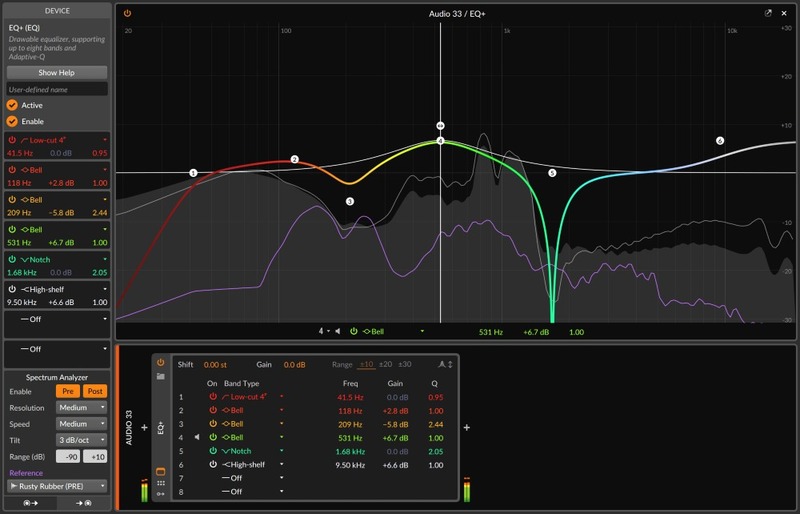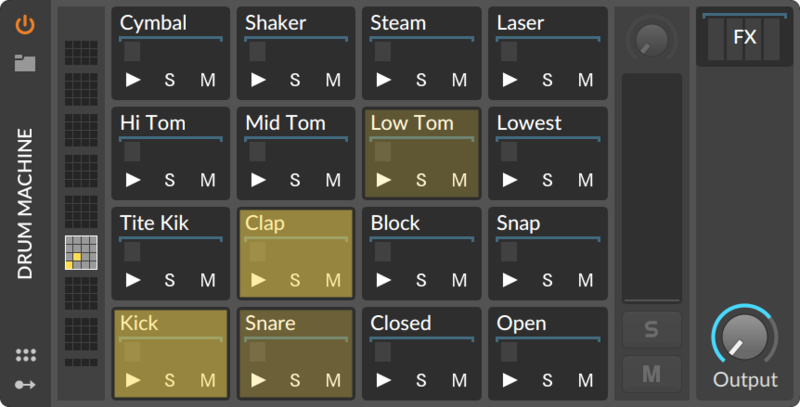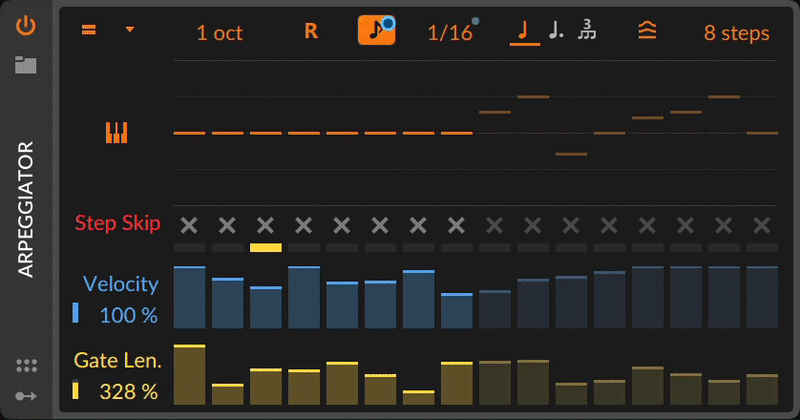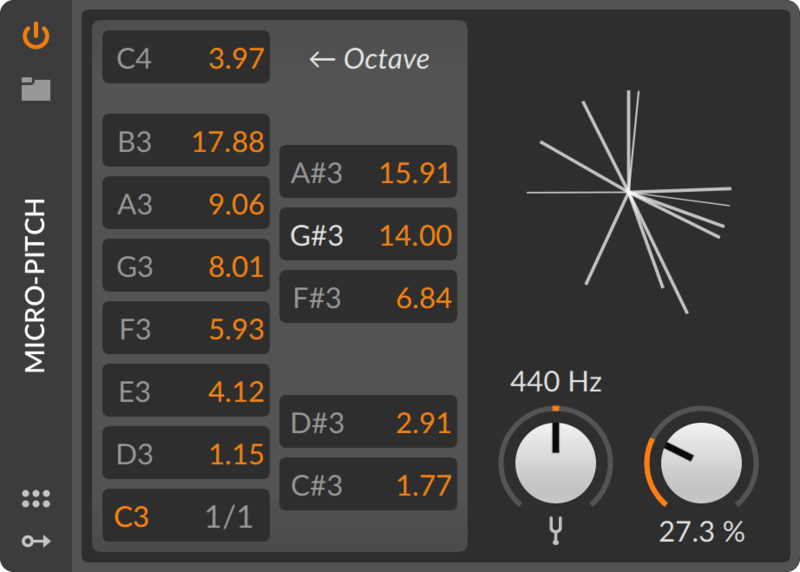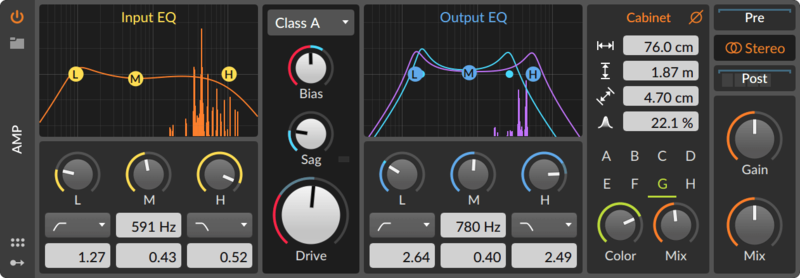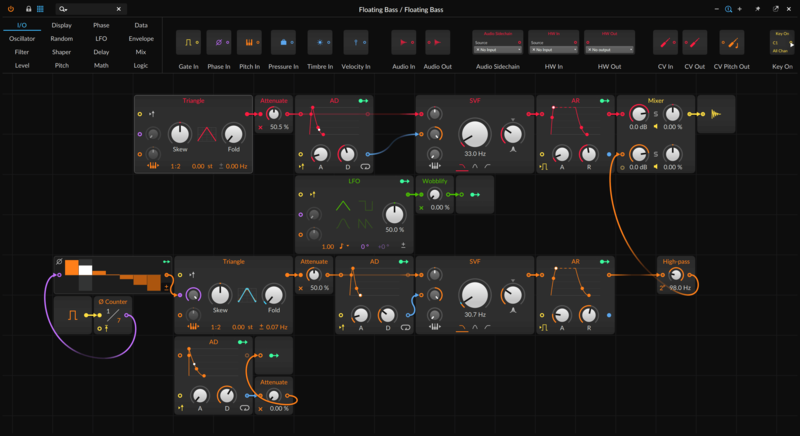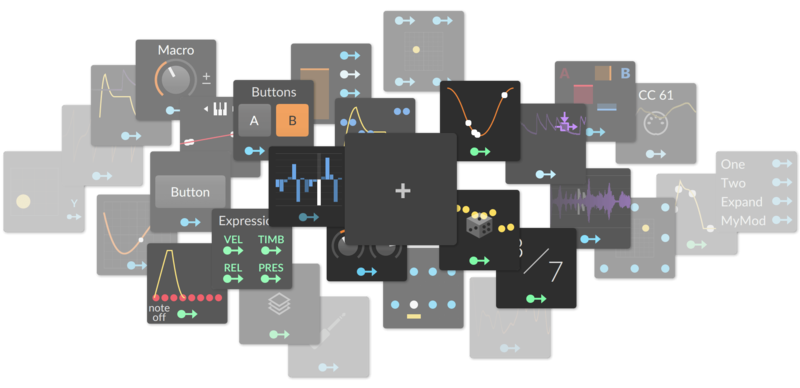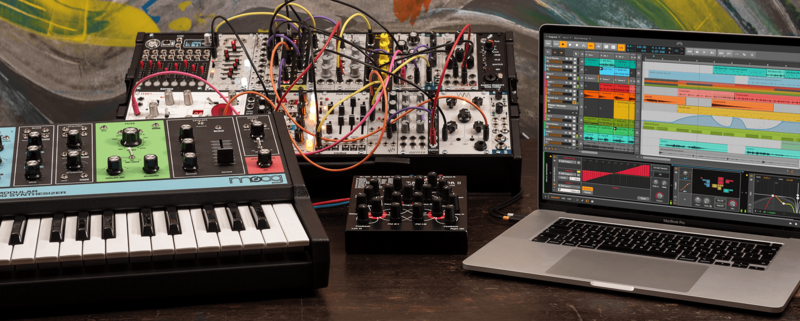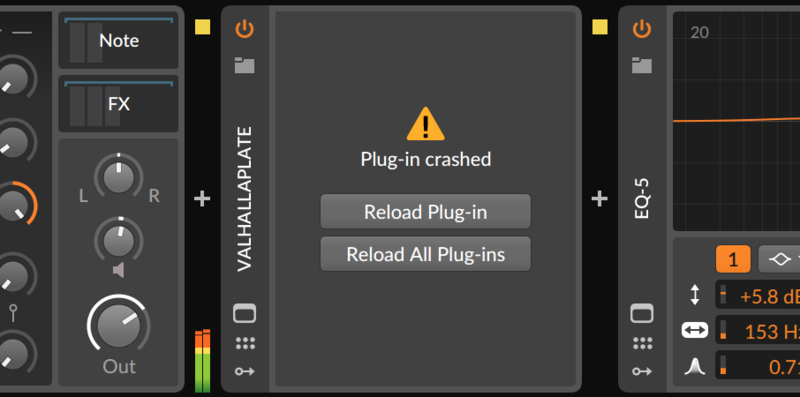- sale
- top rated
Upgrade note: This is an upgrade for owners of Bitwig Studio 5 Producer. The full version of Bitwig Studio 5 is also available.
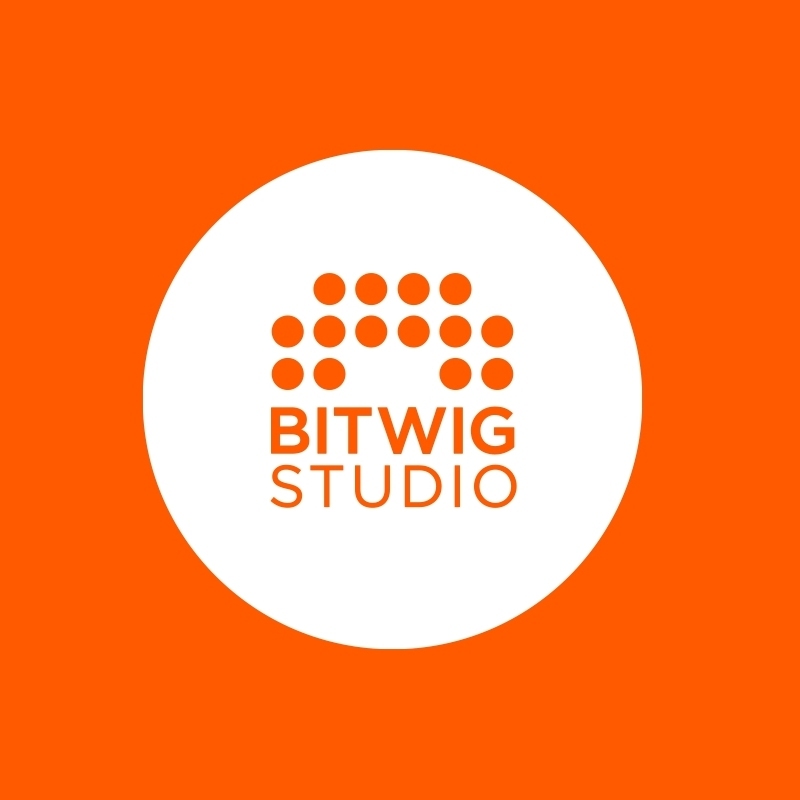
Customized Workflow To Match Any Style
Bitwig Studio is the single solution for realizing any musical idea across every stage of production.
Discover Bitwig Studio 5, the innovative music creation and performance software. Record and arrange in the timeline, perform in the Clip Launcher, and build audio devices in The Grid. Bitwig Studio takes your musical ideas through each stage of production.
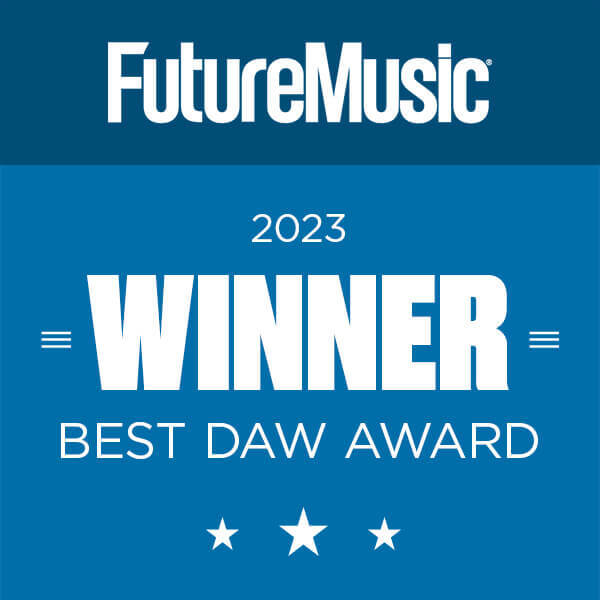
When searching for new sounds, do you focus on the processors? Or is it the generators that make the difference? Bitwig Studio 5 is here, bringing space and tone, with a convolution device for real and imagined spaces, a new delay that loves the spotlight, and some downright electric components for Bitwig synths.
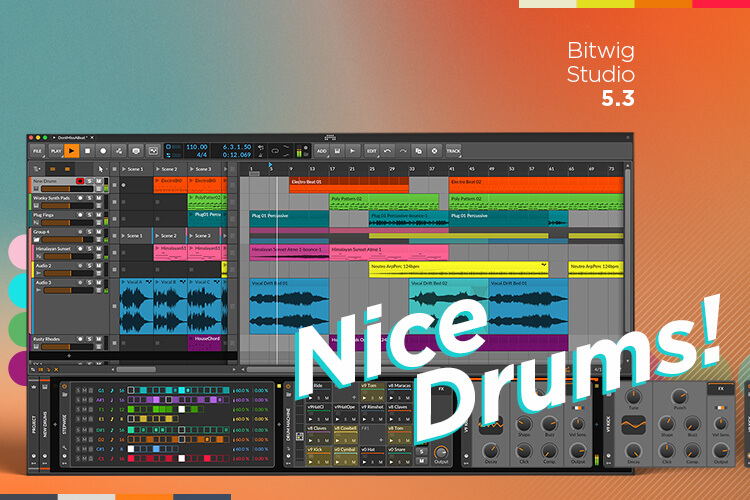
Update: Bitwig Studio 5.3
Modern Drum Devices
Bitwig Studio introduces 25 new percussion devices across three families inspired by iconic drum machines and digital synthesis.
- v8 Family: Based on the 808, with extended parameters for deeper sound shaping.
- v9 Family: Modeled on the 909, featuring additional controls like Impact, Tone, and Punch.
- v0 Family: Six digital drum synthesis instruments using FM, physical modeling, and more.
Stepwise Pattern Sequencer
Stepwise offers a flexible and playful approach to pattern sequencing, enabling polyrhythms, drifting patterns, and creative modulations with per-lane customization.
Master Recording
A new Master Recording feature allows one-click recording directly to disk, capturing performances or moments without interrupting your workflow.
Improved Audio System
Bitwig auto-configures audio hardware, remembers preferences, and now supports multi-interface setups on macOS.
Optimized Performance
Faster project loading and preset browsing with better caching. Added support for Windows ARM machines.
New Grid Modules
Enhancements include analog-style Frequency Shift, Phase-Controlled Pitch Shift, and new tools for advanced sequencing and filtering in The Grid.
Bitwig Studio 5.3 Features
- 25 Modern Percussion Devices: Three families (v8, v9, v0) with deep customization.
- Stepwise Sequencer: Eight customizable rows for patterns and polyrhythms.
- Master Recording: Record live performances or moments directly to disk.
- Auto-Config Audio Setup: Seamless hardware integration and multi-interface support on macOS.
- Optimized Loading: Faster project and preset handling with enhanced caching.
- New Grid Modules: Advanced tools for sound design and sequencing.
Bitwig Studio 5 introduces five new MSEGs. Developing this family of modulators and modules led to a major upgrade for our entire modulation system. In version 5, modulators can do more, like control track- and project-level parameters and expand into pop-out windows. We also created new ways to perform live with our software, and overhauled the browsers to make it easy to find what you need.
MSEGs: Beyond Envelopes
A multi-segment envelope generator (MSEG) is a tool for drawing custom envelopes, automation shapes, looping patterns — and just about anything else. We created five different kinds that can be used as Grid modules, two of which are also available as modulators.
Segments allows you to draw your own envelope with as many points as you need and loop it if you want, while Curves enables you to paint geometric patterns onto a changing beat grid for a unique LFO. And if you can draw your own control signals, why not draw oscillators, too? That's a job for Scrawl, an MSEG with clever math to make handmade waveforms sound good at any pitch. You can even make custom waveshapers with Transfer, or use the phase-driven sequencer Slopes for a deeper level of control.
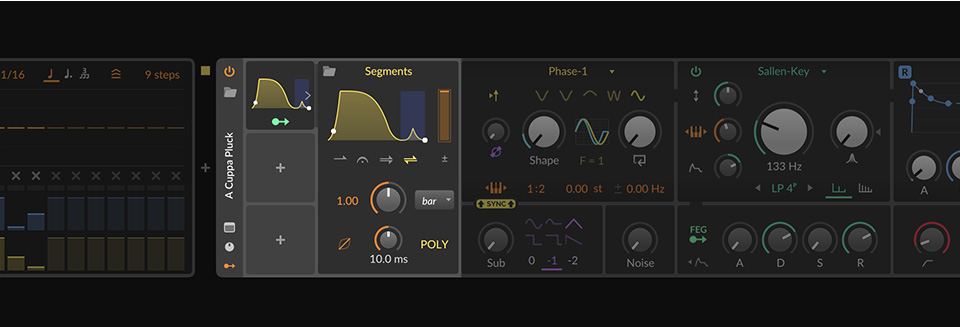
Segments
Segments is an envelope with global time-scaling and loop modes. Use it as a Grid and Polymer module or as a modulator controlling any parameter.
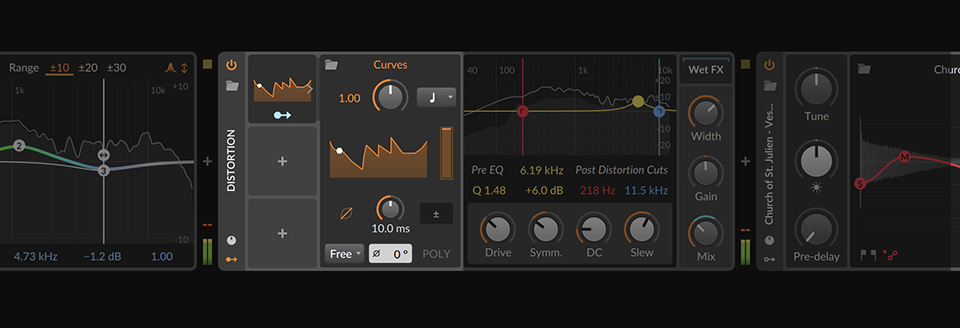
Curves
Curves is an LFO modulator and Grid module that can sync to the beat time or groove.
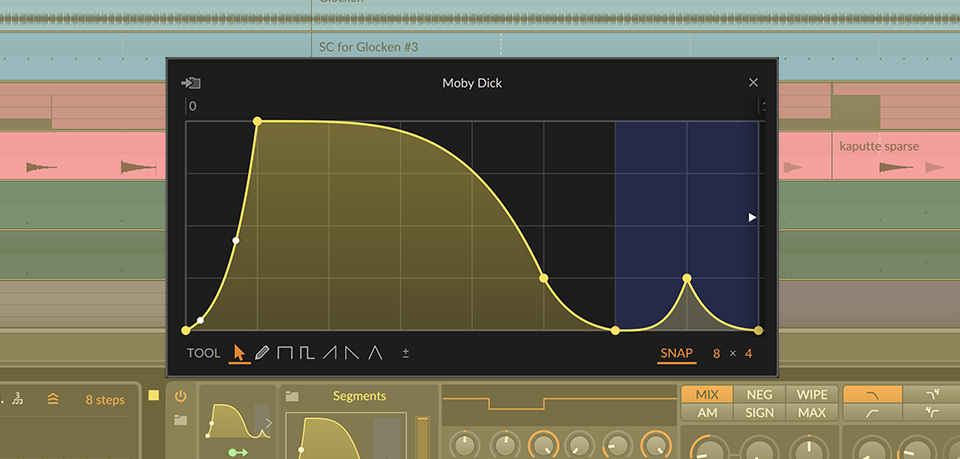
Drawing in the MSEGs' Pop-out Editor windows is a breeze, with tools for freehand entry or shapes, and shortcuts for jumping to double time or triplets — even while still holding the mouse.
Scrawl is an anti-aliasing oscillator for The Grid and Polymer.
Slopes is a pattern sequencer for The Grid with stereo phase options.
Transfer is a waveshaper for transforming incoming audio or other signals in The Grid.
Modulation, Elevated
Bitwig's modulation system sets itself apart with a powerfully simple approach: Any control source — including audio or CV signals — can affect any device or plug-in. Now our modulators aren't limited to devices — they can grab the mixer and project controls as well.

You can now animate your entire mixer with any of our 40+ modulators, from step sequencers to audio sidechains or envelopes. One LFO can modulate any device on the same track, as well as the track's panning, sends, and other parameters. And if you move that LFO to the project level, you can add modulations to all devices, channel strips, and transport targets, too. Want to sidechain the Fill button, or MSEG the project tempo? Now you can.
MSEGs aren't the only 5.0 modulators with Pop-out Editor windows. The Steps and Keytrack+ modulators and The Grid's data sequencers also got resizable panes for cleaner editing and some helpful new functions.
New Performance Gestures
In Bitwig's Clip Launcher, you press a clip to launch it. But what should happen when you let go? Maybe this clip should stop when you pick up your finger, or it could return to whatever was playing before. In fact, any of our Next Actions can be used, so just pick what you want from the clip’s On Release menu.
And now you can choose between two ways to trigger clips and scenes with a new ALT trigger option. The defaults are simple: tap a clip (normal trigger) to launch it at the next bar line, or ALT-trigger to immediately swap in the new clip, legato style. So decide in the moment and perform freely.

Project-wide normal and ALT-trigger gestures can be set in one place, and you can customize any clip or scene to have its own settings. That includes release options for both normal and ALT gestures, legato options for following the playing clip or the project transport, and a revamped Next Action section with simple loop counts.

Now that all tracks have their own remotes, the mixer offers a bird's-eye view of your most important parameters. That way, you can build a customized set of mix and performance controls. And new mapping options allow you to launch scenes and clips with any hardware.
Browse Better
The browser improvements are more than just a fresh coat of paint. Now, search results for plug-ins, presets, and wavetables (etc. etc.) all live in one place. The updated browsers also provide better ways to find our devices, customizable shortcuts, and a more visual way to browse your content.
The new browsers implement a modern, flexible approach that does away with hierarchies. You can search through devices, presets, and everything else — including different types of media or content — all in one screen.
And Then Some…
The foundations got some love too, with a brand new onset detector that makes audio work better from the moment you drag it in. We're also introducing Spanish and Korean language support for Bitwig Studio. A dead-simple Keytrack+ modulator has an embedded MSEG editor window so you can draw your settings or load and save curves. And for morphing control signals, you'll love the new Wavetable LFO modulator/Grid module, equally suited for irregular shapes AND instant techno. Yes, please.
Your Sound is Going Spaces
Bitwig's new device, Convolution, can take any sound anywhere — even places that don't exist. All convolutions imprint your sound with an “impulse,” and ours comes ready-made with 270 of them, ranging from 12th-century cathedrals and legendary studio effects to more abstract “environments.” Using the impulse of a room or hall creates a realistic reverb, but Bitwig's Convolution and content offer so much more.
You can easily adjust color and tone, or draw your own envelope to reshape the impulse itself. Plus, since Bitwig supports “true stereo” (four-channel) files as well as loading any audio as an impulse, you can drag and drop anything onto Convolution and see what impossible space you land in.
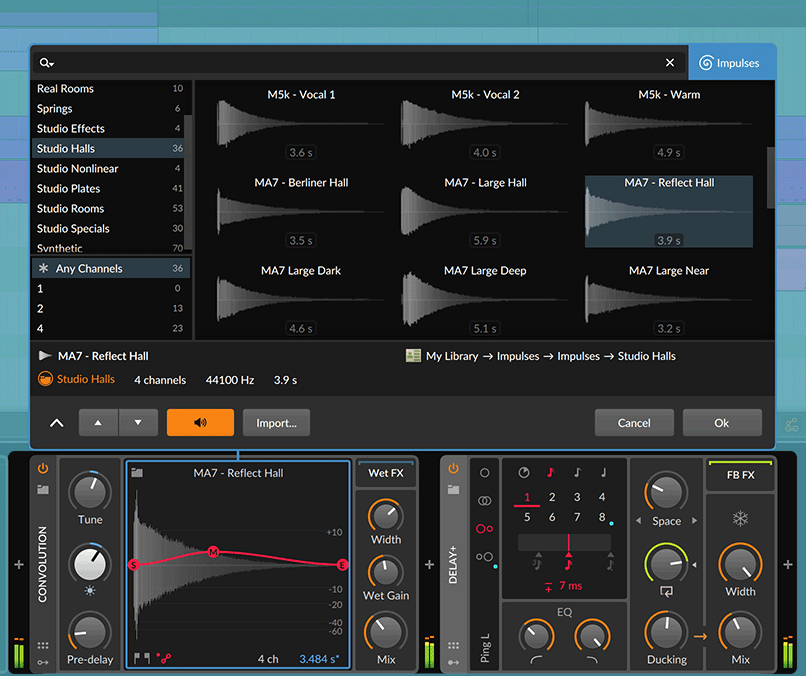
With the help of Bitwig Impulse Responses, the companion package for their Convolution device, your sounds are going places. There are 270 options, so you can take your sounds to locations around the world with reverbs professionally recorded in ancient train stations, French cathedrals, monk meditation halls and private attics. You could also use Convolution and these Impulse Responses to imbue your tracks with the tones of iconic hardware studio gear like vintage spring reverbs, pedals and digital FX units, or for more experimental purposes.
Fashionably Late
Delay+ is Bitwig's latest boutique audio effect. By balancing familiar controls along with a few thoughtful new ones, Delay+ can either add a little character or fully transform your sound as it ping-pongs along.
Set the delay in seconds or beats, then nudge each channel a few milliseconds for instant stereo. Pick from five Blur options to go from a lightly animated feedback to a full, blown-out reverb. A Ducking control keeps things under control by quieting your delay cloud when strong signals arrive.
Bitwig's nested structure allows you to drop their Pitch Shifter, or Flanger+, or any VST plug-in into the feedback loop. So whether you just need a little slapback or a colorful wash of sound, Delay+ has you covered.
The New Face of Polymer
Polymer and The Grid use the same modules, so when something new comes along, everybody wins. For Bitwig 5, some analog-inspired goodies have arrived.
Two modules are new. Union is an oscillator that plays it straight, blending three waveshapes into one pleasant, drifting output. And for filtering, Low-pass MG honors Mister Moog by imitating both his classic filter and mix buss.

But plenty of other features have also arrived. The low-pass SK filter is now Sallen-Key, with 16 modes on tap. Bitwig's Comb filter gained a Damping control for a touch of finesse. ADSR and two other envelopes now have added modes for Digital precision, or Analog simplicity and feel. Plus all filters get a Q Limit to rein in their resonance, and all oscillators have more phase mod range for more brittle, digital sounds. So whether starting a sound in Polymer or growing a world in The Grid, new sounds are at hand.
Perfect Drift - Sound Package
Nature doesn't draw straight lines or make static noises — and neither do the presets in the Perfect Drift sound package, released alongside Bitwig Studio 5. These synth patches embrace asymmetries and inconsistencies to approximate analog's imperfect beauty.
Topping Off
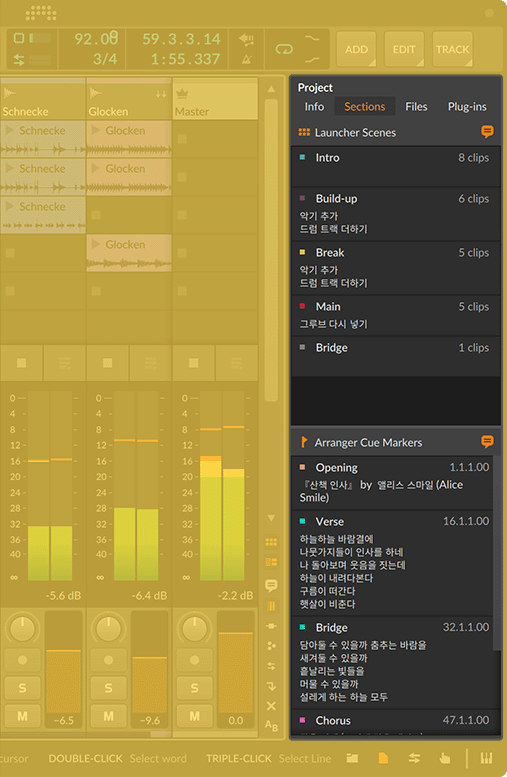
As always, a few more new features came along for the ride. For example, FX tracks now have sends of their own. And yes, direct feedback routings are available — and clearly labeled (Achtung!). And the ADSR module gets a lot of use, so why not add a “bias” out port for a bipolar signal that centers around sustain? Good for pitch or anything that might want a little drift.
Whether it is recording settings, lyrics, or performance notes, comments can be freely added to tracks, layers, Arranger cue markers, and Launcher scenes — just start writing in your language. And by Bitwig distributing their Linux build over Flatpak and supporting PipeWire, many distros will have a smoother experience with Bitwig, including Ubuntu users. And maybe even Steam Decks?…
Bitwig Studio 5 supports the CLAP plug-in standard.
Powerful Editing Tools
Bitwig Studio is here to help you make your musical ideas happen, in as few steps as possible. Focus on the music, not the tool.
Audio That Works For You
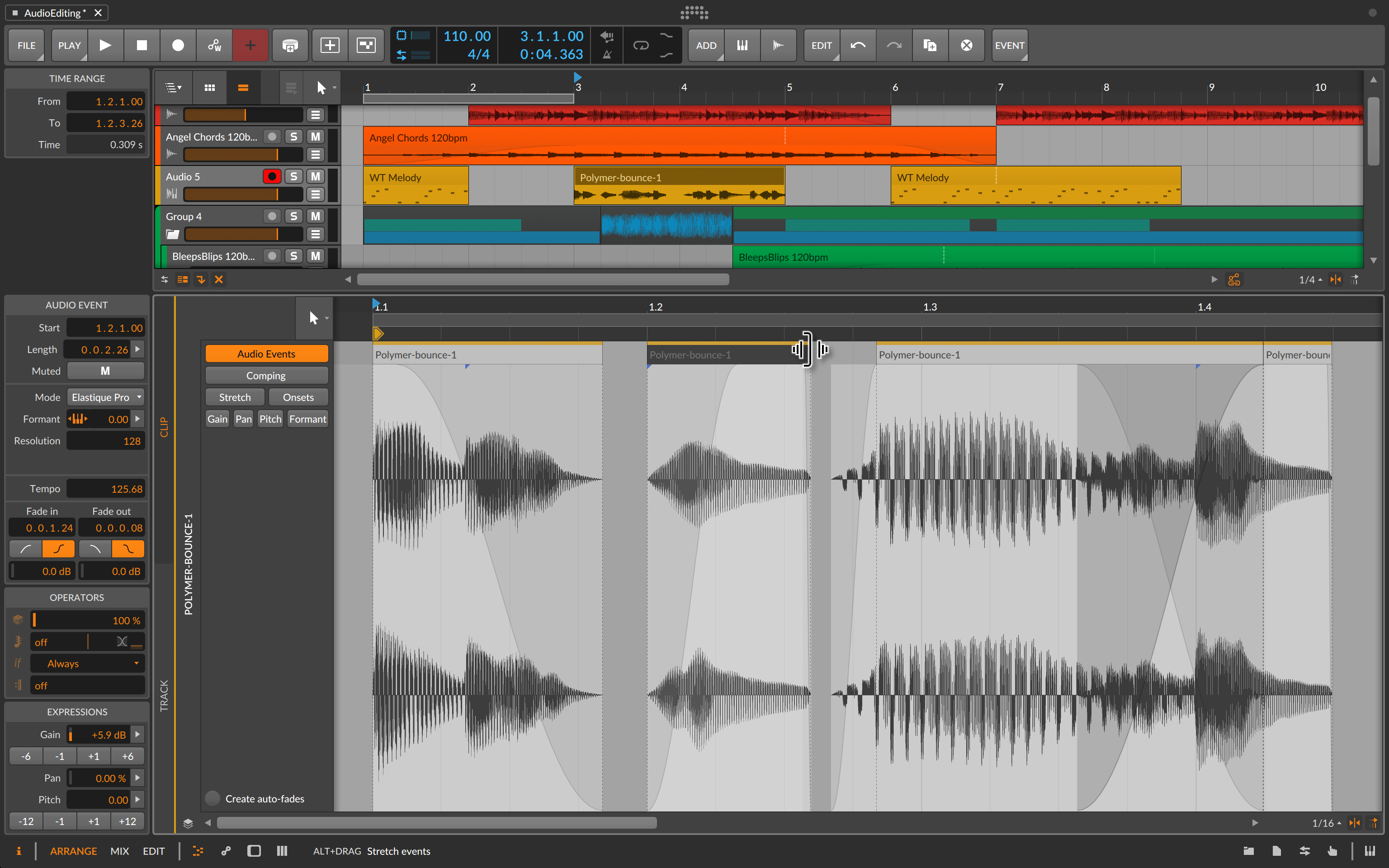
Audio clips are your musical blocks, and edits can be made within them. Split at onsets, repitch with curves, or scale and stretch in various ways. And when the tempo changes, your audio will match it, courtesy of time-stretching options from us and Zplane.
Notes That Do More
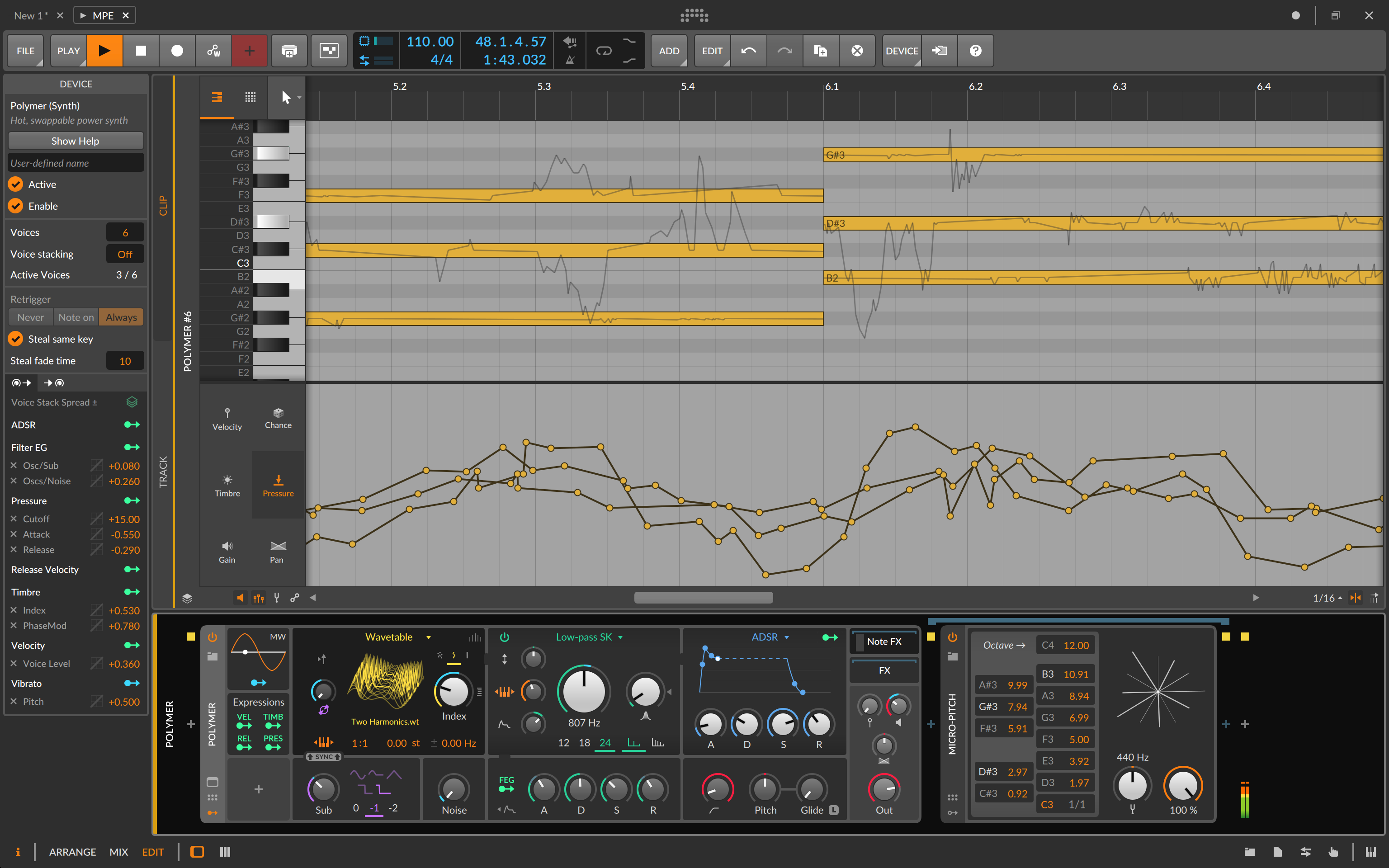
Notes are dynamic, allowing micro-pitch, pressure, panning, and more for each individual note. So get true polyphony from Bitwig's instruments, or send these notes as MPE or CV signals. Or even add some musical logic with Operators, modulating when and how notes play.
Audio Comping, Anywhere
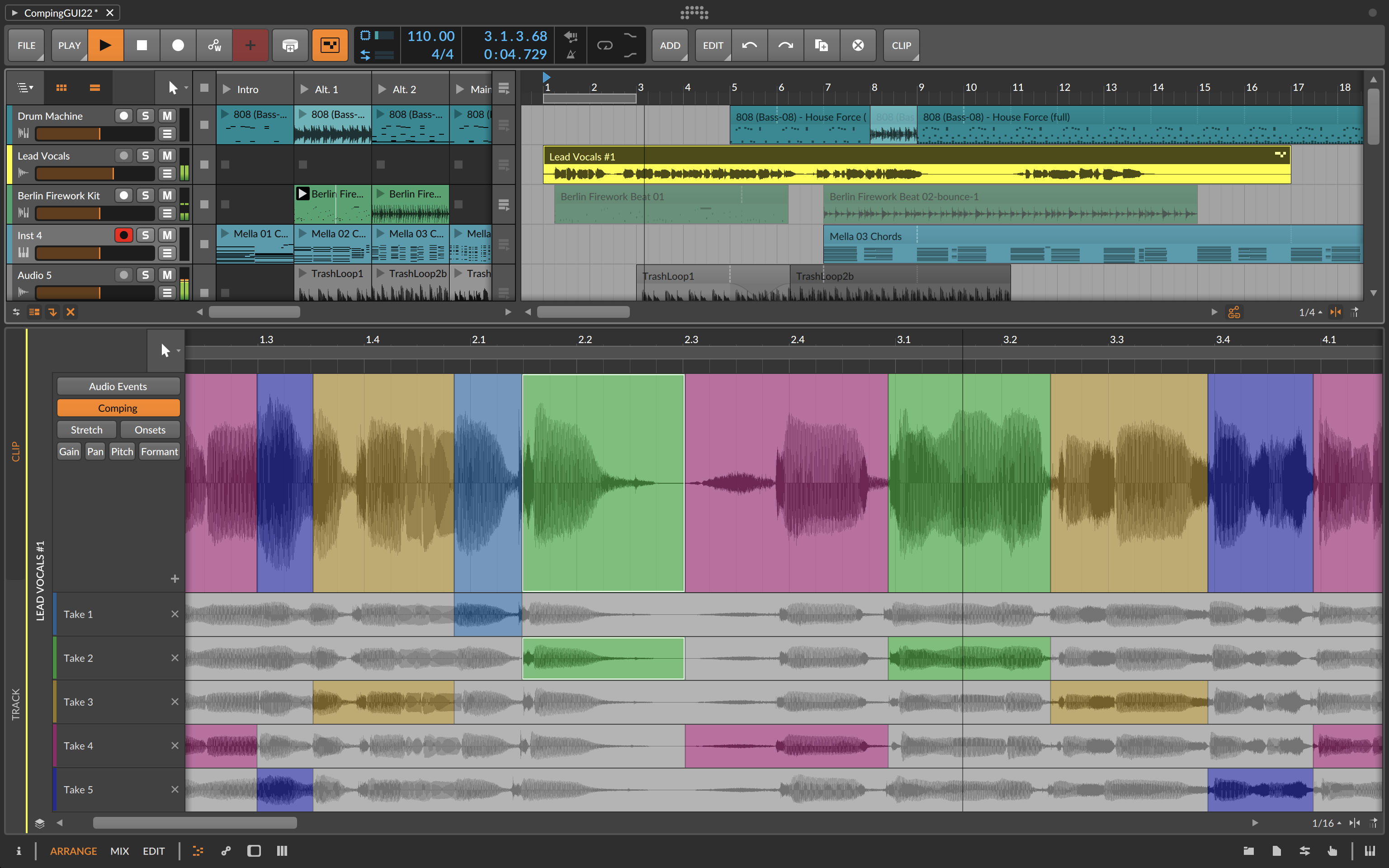
Comping is a clean workflow for recording and then combining the best parts of many takes. This works on any audio clip in Bitwig, so move freely between the Arranger and Launcher. Even drag in long audio to “fold” a new comp, exploring old tapes in a new way.
Instruments & Effects
Here’s a taste of the vast and ever-growing device library that comes with Bitwig Studio. With over 90 different instruments, audio and note FX, container devices, and signal routers you can translate any idea into music.
Polymer
Polymer starts simple: pick an oscillator, a filter, and an envelope generator. Swapping out Grid modules within a dedicated synthesizer is both fast and quick, helping you craft production-worthy sounds from minimal controls immediately.
Sampler
The Bitwig Studio Sampler is a powerful tool for playing and manipulating audio. It boasts several playback modes, advanced looping features with crossfades, endless modulation possibilities, a massive multisample editor, and more...
Phase-4
Meet Phase-4, a four-oscillator synthesizer powered by phase modulation and phase distortion. This unique synth can do classic, modern, and beyond.
EQ+
EQ+ is a feature-packed graphical equalizer with up to 8 bands, mouse gestures, and excellent visualization and algorithms.
Drum Machine
The Drum Machine is a container device that you can fill with sonic goodness. It's never been easier to create unique and great-sounding kits.
Arpeggiator
Individual controls for step velocity, note length, and pitch. 17 note patterns, and three modes for handling octaves. Full MPE support. Even modulate the timing for shifting patterns. Holding chords has never been so musical and dynamic.
Micro-Pitch
Micro-Pitch is a Note FX device that allows you to re-tune your note streams in new ways. Transform scales, fine-tune individual notes, shrink or expand octaves, or even slice the octave into a different number of pieces. Play something unimaginable, today.
Amp
Inject a bit of virtual analogue grit into your sounds with the Amp device, a remarkable piece of amplifier-simulation technology.
Enter The Grid
The Grid is a sound designer's dream. It can be a synth, an audio effect, or most things you can imagine.
The Grid is a modular sound design environment, open for you to build your own creations from scratch.
It's also an expressive instrument with hundreds of high-quality patches for you to explore, ready to play. It's sophisticated yet easy and fast at the same time.
Explore it, Build it, Play it.
Modulation Heaven
The modulation system in Bitwig Studio allows you to use Macro controls, Note Expressions, LFOs, and Envelopes to modulate any device, VST plug-in, or hardware parameter. With 30+ modulators (and counting) the potential for creative expression is endless.
Hardware Integration
Bitwig loves hardware. They also love software. This is why Bitwig Studio wants to blur the boundaries between the two.
Let Bitwig Studio control your hardware, or let your hardware control Bitwig Studio, or both, via MIDI, CC, CV, Gate, analog and MIDI Clock, and MIDI Timecode. Enjoy a collection of straightforward tools that allow you to take advantage of the best of two worlds, and that scales with your setup.
Plus, new for 5.1.4: full integration with SSL UF1, UC1 and UF8 contollers natively in Bitwig Studio.
Modern Foundations
Building a DAW from the ground up allowed Bitwig to think differently and solve old problems in new ways. Bitwig Studio is made for the future...
Crash Protection
Bitwig Studio handles VST plug-in hosting in a unique way, allowing for different hosting modes and plug-in crash protection. With plug-ins, the audio engine, and other processes running in separate threads, a technical issue won't bring your whole project down.
Touch Support
With extensive touch-screen support (multi-touch with unlimited touch points, gestures, pen support, and simulated pressure), Bitwig Studio is at the forefront of new ways to create music. Overall, the user interface of Bitwig Studio is touch-friendly; in addition, there is a dedicated tablet display profile, perfect for any touch screen, or devices such as Microsoft Surface computers.
A Rich Library of Sounds
Bitwig has partnered with some of the best sound designers in the business to give you several thousand quality presets, Clips, and samples right out of the box.
Extend your library with offerings from hand-picked partners and artists, who have painstakingly created loops, presets, and sampled instruments for Bitwig Studio. All are high quality and free to use.
Loopcloud Welcome Package
In a special partnership, Bitwig are proud to offer Bitwig creators a carefully prepared welcome package from Loopcloud.
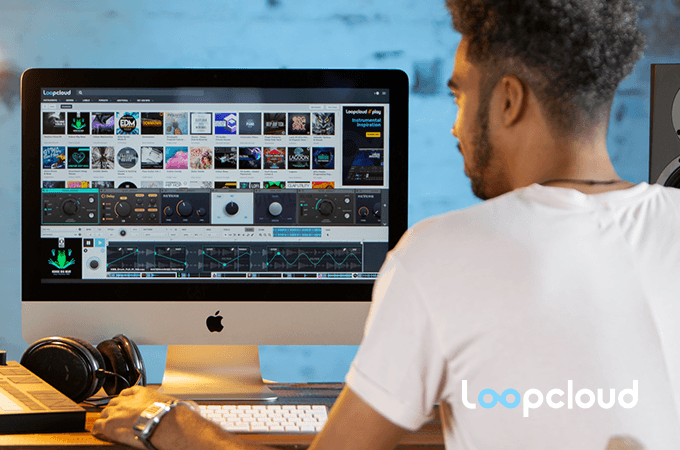
With Loopcloud you get the tools you need to sound like you, and no one else. The award-winning app & plug-ins give you access to millions of sounds in the world's most fully-featured sample manager.
Choose one of four carefully selected sound packs to ignite your creativity:
- Ambient Pulse, a selection of minimal melodics, lush harmonies, and sweeping pads
- Analogue Cinema, a picturesque collection of epic soundscapes for your next soundtrack
- Afro-Cuban Percussion Vol 01, an extensive collection of sun-drenched rhythms and grooves
- Soul Keys Volume One, featuring 200+ soulful loops and licks

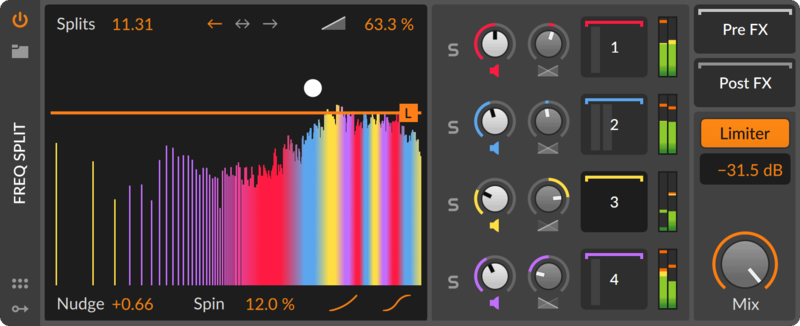
Unlock Your Audio. A New Level For Mixing And Sound Design.
Spectral Suite, the first add-on for Bitwig Studio, consists of four new and unique audio FXs.
By working in the frequency domain, these devices split your audio into hundreds of frequency bands for analysis, and group similar elements together onto channels. From there, you mix the channels as you normally would — adjust the volume, move the panning, or insert a plug-in.
Each device gives access to a different element of the sound…
Transient Split divides percussive transients and tonal sounds. Only stuttering the drum hits in a full loop might be nice. Or separating instruments from percussion means mixing the way you want to.
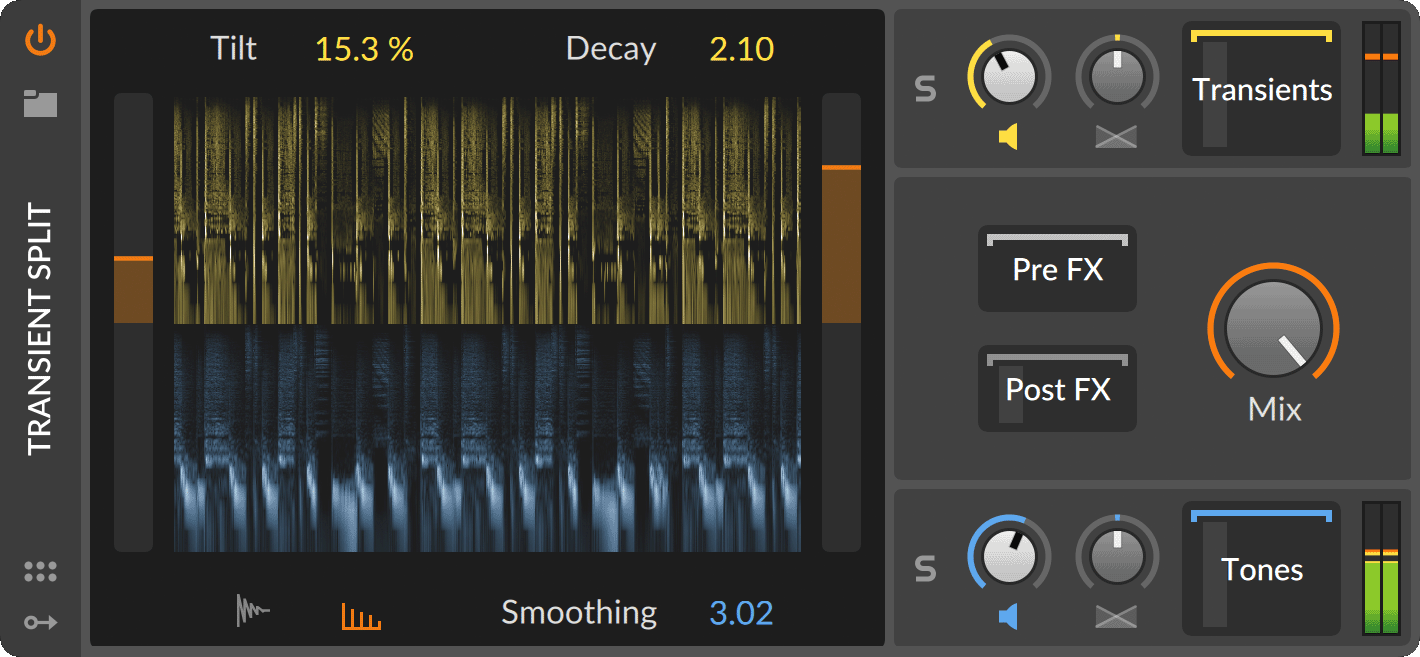
Loud Split separates the quiet, mid, and loud elements within a sound. Cranking up the softest parts of a sound will instantly transform it. Or let a thin section of the sound ring out without breaking the mix.
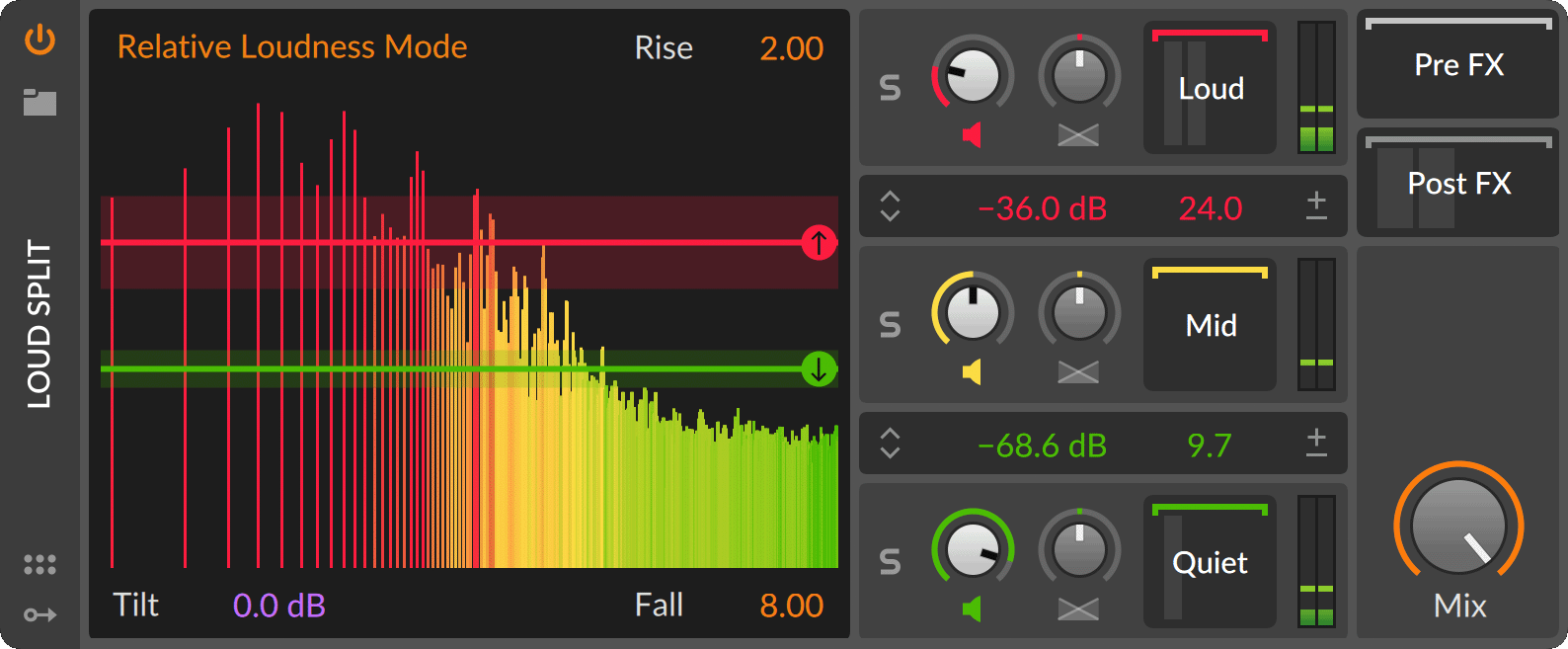
Harmonic Split spreads harmonics into two groups, and collects non-harmonics into a third channel. You could isolate the fundamental frequency and give everything else some distance. Or maybe distorting the even harmonics and adding chorus to the odds is the new cool thing...?
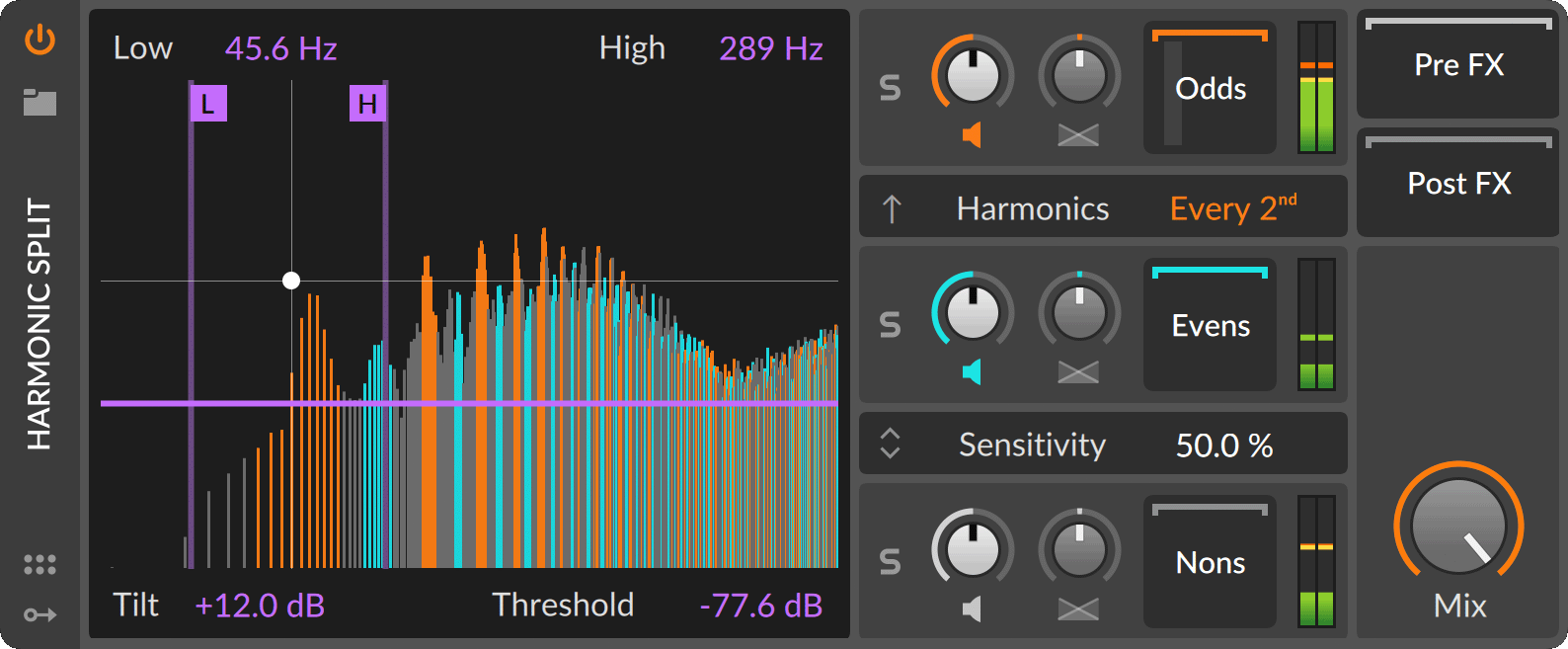
Freq Split distributes a sound across four channels, like a set of filter banks. With random delay times and panning on each channel, you've got a spectral delay. Or use Bitwig's modulators to shuffle thru a different effect on each channel for a new kind of phaser.
Outer Spectra - A New Sound Package
Spectral Suite is accompanied by Outer Spectra, a sound package with 72 presets and 76 clips, all showcasing the four spectral devices in a multitude of musical and mix-related contexts.
What's New In Bitwig 5.2?
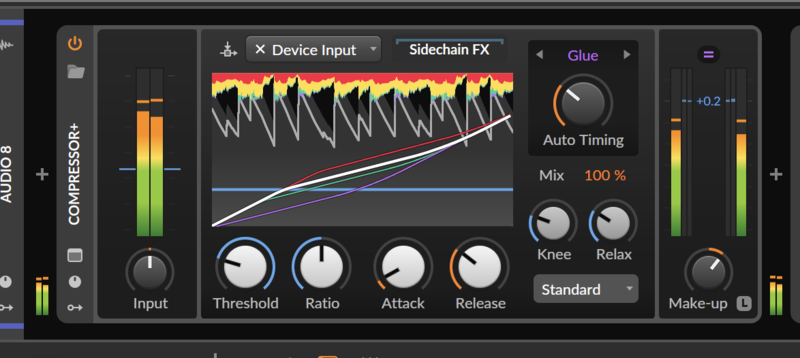
Compressor+
Compressor+ is an all-in-one compressor for any use case. Its combination of familiar with unusual controls and its superior approach to analyzing audio make it excel at adding color and tone as well as mastering.
Six Characters engage different styles of compression by changing various gain reduction and envelope behaviors and numerous "under the hood" settings.
- Vanilla (the default character) applies parameters literally, including Attack and Release times going all the way down to zero.
- Smooth uses slow per-band response, offering minimal distortion.
- Over tends compress more quickly, but in a stable way.
- Glue is slow to engage and quick to release, making it good for transient preservation on the mix buss or anywhere else.
- Resist has longer envelopes and tries to quickly snap back afterward to preserve bass and add even harmonics when pushed.
- Smash over-accelerates the attacks and releases and uses the Auto Timing control to further increase acceleration.
The special Auto Timing control is the amount that timing parameters (Attack, Release, and more) are automatically adjusted to suit the incoming audio. Taken together, the combination of the Character choice and Auto Timing setting offers a wide sonic variety.
Compressor+ analyzes incoming audio across four frequency bands, which are shown on the device's colorful display and in the expanded view. Fold it out to access each band's Intensity and Timing offsets in order to fine-tune which parts of the signal cause compression. So if you want the bass to trigger less, just decrease its band's Intensity. Or if your settings are a little tight on the vocals, try increasing the Timing offset for the hi-mids.
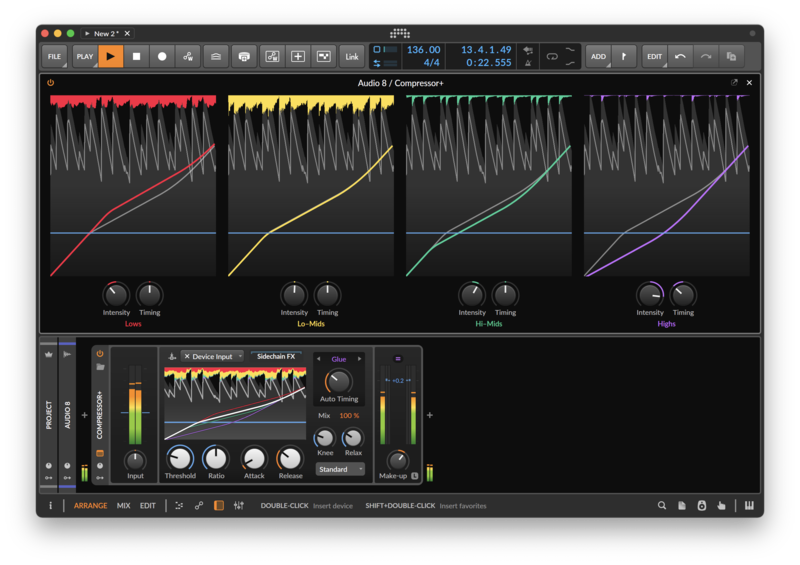
The device comes with three modes that determine the compressor’s behavior:
- Standard compressor mode is the default, that offers a normal range of compressor ratio settings.
- Beyond has an extended compressor range, adding under- and over-compression options by replacing Ratio with a Ratio Extended control.
- Dual is the mode for upwards compression. It lifts quieter signals too by replacing the Knee control with a Lift parameter, which smoothly moves through the custom curves for bumping the signal below the threshold.
The output section of the compressor is stocked with different VCA Colors:
- Clear (the default) applies no coloring.
- Prism gives a clean blend of true multiband compression, with unified single-band compression.
- Transistor provides a consistent analog feel, with a low bump and slightly reduced highs.
- Saturate has a moving analog feel, like tape saturation, with a mid-range bump and some frequency-dependent behavior.
"Compressor+ is super flexible. It combines features from different types of compressors from analog and digital worlds. It packs them into a one-stop shop where you can dial everything quickly and flick between different types of harmonic distortion or envelope behaviors. You can use the excellent presets or very quickly dial in the tones you need." -Yoad Nevo, mastering engineer (Ed Sheeran, Sia, Pet Shop Boys)
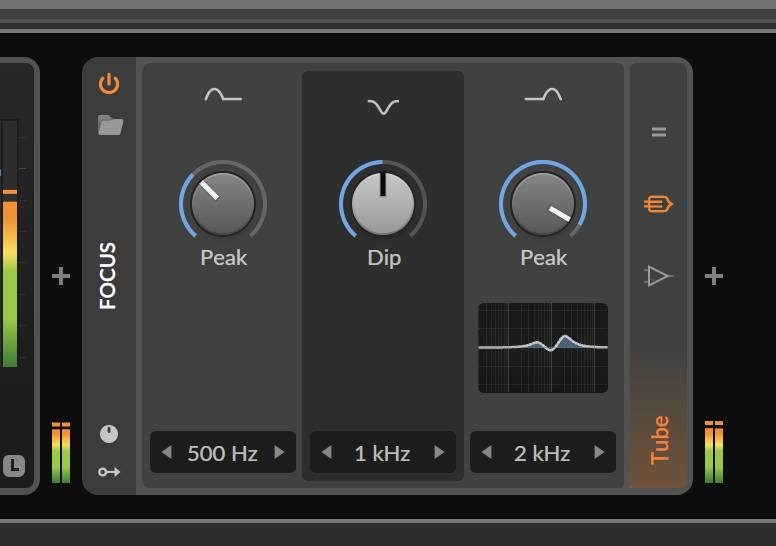
Focus, Sculpt and Tilt EQ
In Bitwig Studio 5.2 a new trio of EQs inspired by classic hardware — Focus, Sculpt, and Tilt — bring a natural musicality to the task of shaping sound.

Sculpt inherited the controls and components of the renowned Pultec EQP-1, a vintage broadband EQ good for bass sweetening and more, using preset frequency choices to quickly dial in magic. But the choice of saturation is left to you, from the matching Tube style, to Transistor for even harmonics and mid-range punch, or even a clinically Clean model.
Focus took the same approach to recreating the choices and components of the mid-range-oriented MEQ-5. After tuning those sonic "power" regions, similar saturation choices are a click away.
Tilt's simple interface lets you re-balance any sound to be brighter or darker, with additional choices for the center Frequency and how steep the Slope is.
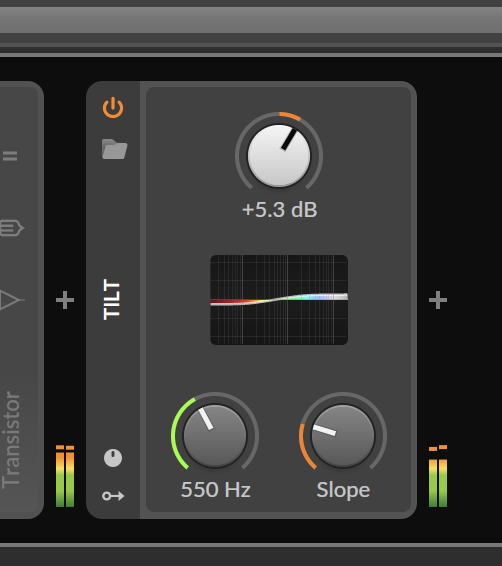
A Stereo-ize option is available in all three EQs for effectively duplicating the unit and then tilting it a variable Amount in the Stereo field (to push up frequencies and gain in the left or right channel), or to apply in the mid-side domain.
Precise Audio Editing
When working in any of the timeline editors, Bitwig Studio has two ways of making a selection. Each method has its own unique functions and keyboard workflows, so it is also possible to Switch between selection kinds in the Edit menu. Object selection starts with choosing one or more timeline objects (such as clips, audio events, note events, expression points, or automation points). This is usually achieved by clicking objects with the Pointer tool. The computer keyboard's arrow keys default to whatever makes sense in each particular case — for making selection (with clips and points), or for moving events (with notes and audio events) — but the alternate case is available via the [ALT] key.
Time selection captures any events (or partial events) within a span of time. This is usually achieved with the Time Selection tool. Clicking into an editor with this tool selects a single moment of time, which then allows the computer keyboard's arrow keys to jump between significant events (such as audio onsets, or note starts and ends). This allows quick, precise editing right from the Arranger, or at any other level. captures any events (or partial events) within a span of time. This is usually achieved with the Time Selection tool. Clicking into an editor with this tool selects a single moment of time, which then allows the computer keyboard's arrow keys to jump between significant events (such as audio onsets, or note starts and ends). This allows quick, precise editing right from the Arranger, or at any other level.
Now with Bitwig Studio 5.2 the arrow keys can now send you between relevant points of interest in clips or on the Arranger Timeline, or even between different tracks in the project. Cruise the Arranger Timeline via small increments like beat divisions, automation points, clip starts and ends and more. Jump from the beginning to the end of notes within their clips, or from transient to transient in audio clips. Make a selection — of notes, clips, events, etc. — across one or more tracks. And you can do all this without leaving the keyboard.
Dynamic Beat Detection
Speaking of quality-of-life improvements, 5.0's better onset detection bears fruit this update in ways that streamline working with different tempos. You can trust Bitwig Studio to accurately warp long audio files for you — even those with variable tempos will stay on track.
Onset analysis happens when audio is dragged into a project, as does beat detection, which determines where beats occur within the audio.
Alternatively, your project can adapt to the clip's time, bringing new conveniences to the process of making DJ mixes, podcasts, or adding production to long recordings. Your project can adopt an audio clip's tempo as a static value with Set Current Tempo, or apply its timing changes as an automation curve on the global tempo with the Apply Tempo Curve To Arranger command.
Hardware Acceleration for the GPU
The graphics interface has been rewritten to be more responsive and efficient. Painting the Bitwig interface on your computer's GPU gives Bitwig native hardware acceleration, and more CPU is now available for your audio. Also, knobs pop more and scopes have a fresh look.
Drawing in general has been highly optimized as well, running fewer commands and giving springier results. So whether you just have high track counts and thousands of events or you are fond of quick zooming and editing, you will be covered. On all three platforms.
And More
- Over is a boutique clipper that harnesses multiband, oversampling, and a slot for wet-only effects. So add a nice crispy crust to any sound, or just burn it down.
- The Chain device also got its own Learn Wet Gain option, giving you a perfectly configured Mix knob for blending any audio effect chain, including plug-ins.
- The Grid now has Crossover-2 and Crossover-3 modules in the Mix category.
- Additionally, Multi-Note got its own Chord Learn function for immediate programming and playback.
- The FX Selector device earned crossfade timings so you can fine-tune your transitions. And for programming synth structures, the variable Shift Register module and simple All-pass might help you out.
- Plug-in Undo allows you to quickly undo changes applied to third-party plug-ins. So no matter what you change, Bitwig can always bring you that critical one step back.
Read all the details in the changelog here.
Features
- High-Performance Audio Software, with Full Multicore and Multiprocessor Support
- ASIO, Core Audio, and JACK support including JACK transport on all platforms
- 32-bit floating-point Audio Processing and up to 192 kHz Audio Sample Rate
- Scalable vector-based GUI
- Unlimited Audio, Instrument and Hybrid Tracks
- Unlimited Effect Tracks
- Unlimited Group Tracks (with Groups in Groups)
- Unlimited Scenes
- VST Plugins (with Side-Chain Support, 32-/64-bit Bridging, Delay Compensation, and Crash Protection)
- VST/CLAP Plugin Multi-Out
- Audio Comping
- Audio Export (including Multi-Track Export) (16-bit, 24-bit, 32-bit)
- File Import - WAV, AIFF, MP3, AAC, WMA, FLAC, OGG Vorbis, MIDI
- Audio I/O busses
- Time-Stretching (8 Algorithms - Stretch, Stretch HD, Slice, Cyclic, Elastique, Elastique Solo, Elastique Eco, Elastique Pro)
- Slice to Multi-Sample and Slice to Drum Machine
- Layered Editing (Notes and Audio)
- Bounce and Bounce in Place
- Multiple Projects
- Expanded Remote Control Editor
- Display Profiles (7 Profiles - Single & multi-display)
- Project Templates (Load and Save)
- Seamless integration of clip launcher and timeline
- Touch Integration
- MPE Support - Playing, Recording, and Editing
- Plug-and-Play MIDI Controller Support
- Open Controller API
- MIDI Clock Sync
- Ableton LINK
- Voice Stacking for all devices
- Operators for notes and audio events
- Access to Bitwig Circle - get access to incredible offers and free software from Bitwig's trusted partners. Past partnerships include Klevgrand, Baby Audio, Kilohearts, and Splice.
System Requirements
Mac
- macOS 10.14 or later (including Monterey)
- 64-bit Intel or Apple Silicon CPU
- Minimum 12 GB Free Disk Space (for Full Content Installation)
- Minimum 1280 x 768-pixel screen resolution.
- Minimum 4 GB RAM
Windows
- Windows 7 - Windows 11 (64-bit only)
- Dual-core AMD or Intel CPU or faster with SSE4.1 support
- Minimum 12 GB free disk space (for Full Content Installation)
- Minimum 1280 x 768-pixel screen resolution.
- Minimum 4 GB RAM
Linux
- Ubuntu 18.04 or later (64-bit only)
- 64-bit dual-core or better x86 CPU with SSE4.1 support
- Minimum 12 GB free disk space (for Full Content Installation)
- Minimum 1280 x 768-pixel screen resolution.
- Minimum 4 GB RAM
Important Note: A decent internet connection is required in order to download all bundled content (not included with the installer).
Any references to any brands on this site/page, including reference to brands and instruments, are provided for description purposes only. For example references to instrument brands are provided to describe the sound of the instrument and/or the instrument used in the sample. Plugin Boutique do not have (nor do they claim) any association with or endorsement by these brands. Any goodwill attached to those brands rest with the brand owner. Plugin Boutique or its Suppliers do not accept any liability in relation to the content of the product or the accuracy of the description. "RHODES" is a registered trademark of Joseph A Brandstetter.

